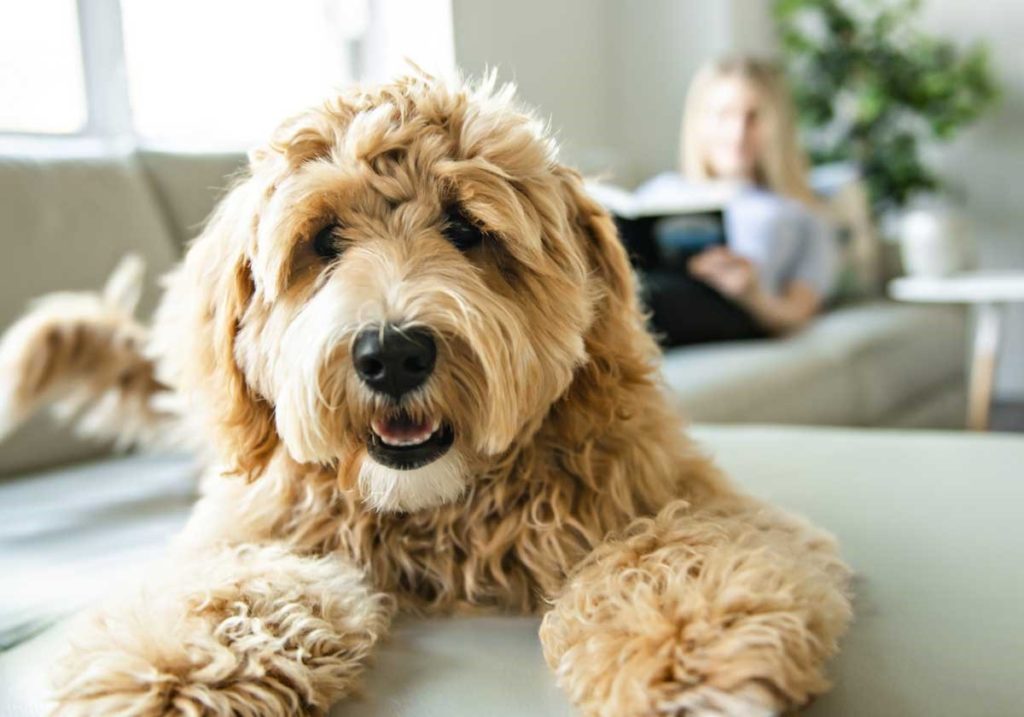An adorable mix between a purebred Golden Retriever and a purebred Poodle, the Goldendoodle has become increasingly popular as an ideal combination of cuteness, smarts, minimal shedding, and easy-going temperament. Often referred to as a “designer dog,” this hybrid is bred for specific traits that make it a perfect family dog. As a relatively hypoallergenic dog, Goldendoodles are also loved by pet owners with allergies and those not wanting to deal with the messes of shedding.
Table of contents
History
Goldendoodles are relatively new on the dog breed scene. In fact, the mix is not yet formally recognized as a distinct breed by the American Kennel Club (AKC). They were initially introduced in the 1990s as a larger alternative to the original low-shed designer dog, the Cockapoo, a Cocker Spaniel-Poodle mix. Goldendoodles have become increasingly popular in the United States since then, particularly with the rise of social media, through which a broad audience has been able to discover and find information about the breed.
Goldendoodle Generations
You may notice that Goldendoodles and other breed hybrids are referred to as F1, F1B, F2, etc. These distinctions indicate the pup’s generation, or what their parents are. A Goldendoodle’s generation influences some of the pup’s physical traits.
F1
Most Goldendoodles in the United States are F1 or first-generation Goldendoodles. This means that two purebreds—one Golden Retriever and one Poodle—crossed to produce 50/50 puppies. These dogs have a great combination of the easy-going temperament of Golden Retrievers and the intelligence and minimal shedding of Poodles. F1 Goldendoodles are often considered hypoallergenic with some light shedding and have a shaggy, wavy coat.
F1B
F1B Goldendoodles are the result of breeding one F1 mix and one purebred Poodle, which shifts the offspring’s genes to 75% Poodle and 25% Golden Retriever. F1Bs are considered the most hypoallergenic Goldendoodle mix with 99% of them being completely non-shedding. This makes them very popular—some breeders report that F1Bs are the most desirable generation. These dogs have the same personality strengths and good health that all Goldendoodles have, with more coat color variation due to more extensive Poodle lineage. With curly coats, F1Bs have substantial grooming needs to keep them clean and prevent their coat from matting.
F2
Second generation Goldendoodles are bred from two F1 parents. With this, they maintain their 50/50 Golden Retriever and Poodle mix, just with more extensive genetic diversity. The coats and even sizes of F2 Goldendoodles can vary greatly and are a little more unpredictable than earlier generations.
F2B and more
These dogs are a mix of different generations, often an F1 and an F1B. There are nearly an unlimited number of possibilities for combinations of generations and mixes. You may see some mixes referred to as “backcrosses,” meaning that the pup’s parents are one F1 and one F1 parent breed.
Size
Goldendoodles vary greatly in size, as the Golden Retriever parent can be crossed with either a Miniature Poodle or Standard Poodle. With this, they are typically considered a medium-sized dog. Mini Goldendoodles can weigh between 15 and 35 pounds, while Standard Goldendoodles can range between 45 and 100 pounds.
Appearance
Your Goldendoodle’s appearance will also heavily depend on their parents and who passed on more dominant genes. Generally, Goldendoodle coats tend to be medium in length and relatively thick. Their hair—not fur—is shaggy and either wavy or curly. While some generations or mixes are considered more hypoallergenic than others, all Goldendoodles are considered low shedding. Coat colors are likely to be gold, cream, or red depending on the Golden Retriever bloodline. However, these dogs can also be black, white, grey, brown, or any combination found in Poodles.
Grooming
Overall, Goldendoodles have moderate grooming needs. This varies depending on the dog’s size and coat. While they do not require bathing more than once every few months—no more or less than average breeds—long coats should be brushed daily to prevent matting. Goldendoodle parents often opt to regularly trim coats short to avoid extensive grooming needs. It’s also common to trim Goldendoodle hair around the eyes and between paw pads for comfort.
Activity
Goldendoodles are extremely athletic and make great companions for walks, runs, hikes, agility training, or playing in the backyard. They also tend to love water, making them great swimmers. Their retriever genes also make them avid fetch players.
With moderate to high energy levels, Goldendoodles are not for the lazy pup parents. They require at least 30 minutes to an hour of exercise each day. Not only do they need an extensive amount of time moving, but they also need ample space for moving. Goldendoodles aren’t necessarily the best apartment or small space dogs—they thrive with a large, fenced-in yard at their disposal.

Health
In your puppy search, regardless of what breed you’re looking for, it’s crucial to find a reputable breeder who is committed to breeding healthy dogs. This is certainly true for Goldendoodles, who, if bred and cared for responsibly, have excellent overall health. It’s possible for Goldendoodles to inherit breed-specific health issues of one or both parent breeds. For example, Golden Retrievers are known for high cancer rates, which can be passed on even crossbred offspring. However, their genetic diversity, sometimes referenced as “hybrid vigor,” has the potential to minimize these hereditary health concerns. These dogs usually live between 10 and 15 years.
Goldendoodle owners should be aware of some of the more major health concerns that this crossbreed can be prone to. As larger, active dogs, Goldendoodles can be susceptible to elbow and hip dysplasia, which can either be inherited or triggered by malnutrition and is often degenerative, leading to arthritis with age. They are also prone to patellar luxation, or dislocation of the kneecap. Other more serious health concerns for Goldendoodles include hypothyroidism and Von Willebrand’s Disease, which impacts blood clotting.
Allergies
Less serious health concerns associated with Goldendoodles include skin and food allergies, as well as ear infections, as their droopy ears don’t allow water to drain easily. Goldendoodles are also susceptible to Progressive Retinal Atrophy and other eye problems, which are more likely to come on in a dog’s advanced years.
Fortunately, Goldendoodles are not prone to becoming overweight and developing obesity. The athletic and high-energy nature of the hybrid keeps them active with little opportunity to gain problematic weight. These dogs should be fed a high-quality, high-protein diet to support their active lifestyle. Pet parents should be mindful to feed their Goldendoodle pups several small meals throughout the day rather than one large meal. Golden Retrievers—and consequently, their mixed offspring—can suffer from gastric torsion or bloat.
Personality
Bred for their loving, easy-going temperament, Goldendoodles are beloved family dogs who generally get along with people and other pets, and are gentle with children. They are notably friendly and very social, so while they’re wonderful family pets, they would make terrible guard dogs. Socialization is key for Goldendoodles—they thrive when given opportunities to socialize and do need attention, meaning that they can be prone to separation anxiety if not trained or left alone for too long.
Goldendoodles are considered generally non-destructive and non-disruptive. They are not known for being incessant barkers, diggers, or chewers. Due to their social nature and high activity levels, they can get bored easily. Goldendoodles are excitable, so adequate stimulation, exercise, and training are key to ensuring good behavior.
This hybrid does not have much of a prey drive. They are often eager to please and have strong attachments to their people, which makes them not especially likely to wander off or bolt out the door when given the opportunity. Again, training and exercise are important here.
Training
Goldendoodles have all of the necessary qualities to make them easy to train. They’re eager to please, obedient, and loyal. What’s more, Goldendoodles are highly intelligent—both Golden Retrievers and Poodles often rank highly amongst the smartest dog breeds. They tend to respond well to positive reinforcement and reward-based training, so have treats on hand and you’re in good shape!
Goldendoodles are often trained as service animals. They are known as excellent guide dogs, search and rescue dogs, therapy dogs, and allergen and diabetes detection dogs.
Are Goldendoodles good for first-time dog parents?
YES! Overall, Goldendoodles are sweet, healthy dogs who are up for anything. They’re known to be friendly and not prone to any major behavioral problems, so with the proper training and socialization, it’s hard to find a better companion than a Goldendoodle. Don’t forget to give them plenty of exercise and the necessary grooming, and you’ll have a best friend for life!
Any health or medical information in ElleVet blogs is from a variety of public and reputable sources. This information is intended as an educational resource only is not a substitute for expert professional care.











